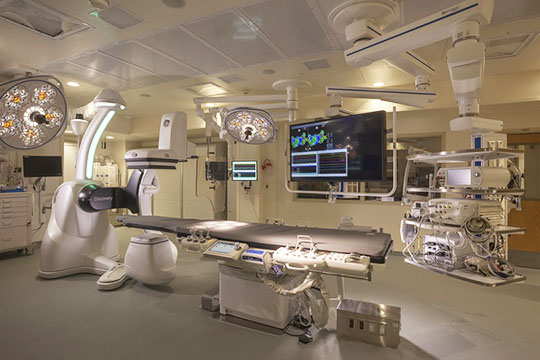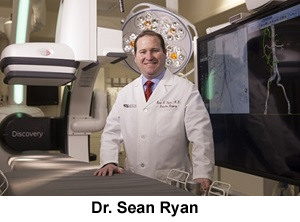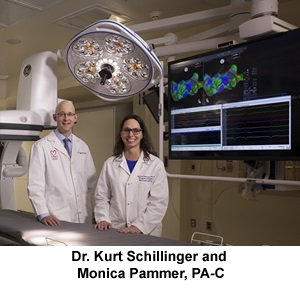Treating More Patients Close To Home
Chester County Hospital’s Invasive Cardiovascular Services has recently renovated its third cardiac catheterization lab. The new “Cath Lab 3” features an expanded room layout and state-of-the-art imaging technology, allowing its multi-disciplinary team to efficiently expand its Peripheral Vascular Services and manage a rapidly growing Electrophysiology department.

Prior to the renovation, the room had structural limitations due to the age of the building, which dates back to 1925. These limitations made it challenging to install new high-tech equipment necessary to perform advanced procedures. Cath Lab 3 was originally opened in 1991 when the department performed diagnostic procedures only. In 2004, the room was re-designed to an Interventional Cardiovascular suite with up-to-date digital imaging equipment and technologies that supported interventional vascular procedures. In 2005, the program was expanded again to add Electrophysiology and Ablation procedures. Chester County Hospital continues to appreciate exceptional growth in Interventional Cardiovascular services.
“Our ablation program has witnessed transformational growth over the last two years with the addition of advanced ablation technology and an expanding team of Electrophysiology providers. The Peripheral Vascular program also continues to grow and treats increasingly complex vascular disease. To accommodate advanced therapies and provide more services to the community, we needed to extensively renovate the suite,” says Tim Martin, BS, RCIS, Business Operations Manager for Invasive Cardiology.
The six-month renovation began in June 2016 and included gutting the entire suite, expanding the procedural area and control room, as well as adding new flooring that could accommodate industry-leading equipment. A major component of this renovation includes investing in technology, including an advanced vascular imaging system: the GE Discovery ISG 730.
The GE Discovery ISG 730 provides superior imaging services while reducing the amount of radiation exposure to the patient and clinician. In addition, its distinctive mobile platform brings the same capabilities of a fixed system while allowing the imaging system to fit around and away from the patient, making it easier to perform surgical procedures.
 Sean Ryan, MD, Chief of Surgery and Section Chief of Vascular Surgery, explains some of the major benefits of this new system, “We can get much better imaging when we’re intervening on blocked blood vessels or aneurysmal blood vessels. We can perform these procedures with less radiation and contrast dye, which makes this safer for the patient, operator and staff. Since the imaging is crisp and clean, we can ensure a better outcome meaning fewer complications and a shorter stay for the patient.”
Sean Ryan, MD, Chief of Surgery and Section Chief of Vascular Surgery, explains some of the major benefits of this new system, “We can get much better imaging when we’re intervening on blocked blood vessels or aneurysmal blood vessels. We can perform these procedures with less radiation and contrast dye, which makes this safer for the patient, operator and staff. Since the imaging is crisp and clean, we can ensure a better outcome meaning fewer complications and a shorter stay for the patient.”
The new technology also gives the hospital the ability to treat patients with more complex illnesses right in Chester County, rather than sending them to another institution. “What I’m most excited about is the ability to treat patients who have aortic aneurysm disease, which is a weakening of the wall of the blood vessel of the major artery in the body. We can treat these patients by using high-quality images and pre-planning software with a minimally invasive approach. The procedure requires almost no incision whatsoever and most people go home the next day,” Dr. Ryan adds.
In addition to the upgrade in equipment for vascular services, Chester County Hospital has also included leading-edge technology for electrophysiology services, including the BioSense Webster CARTO® 3, an advanced mapping ablation system.
 Kurt Schillinger, MD, PhD, Cardiologist and Chief of the Atrial Fibrillation Ablation Program, explains some of the new technology impacting electrophysiology services. “One of the biggest investments has been in three-dimensional electroanatomic mapping. This equipment is like a GPS that’s used for the patient’s heart and allows us to create a three-dimensional shell of the cardiac structures. We can then manipulate catheters inside the 3D shell to keep track of where catheters have been and where they’re going to increase the success of the procedure.”
Kurt Schillinger, MD, PhD, Cardiologist and Chief of the Atrial Fibrillation Ablation Program, explains some of the new technology impacting electrophysiology services. “One of the biggest investments has been in three-dimensional electroanatomic mapping. This equipment is like a GPS that’s used for the patient’s heart and allows us to create a three-dimensional shell of the cardiac structures. We can then manipulate catheters inside the 3D shell to keep track of where catheters have been and where they’re going to increase the success of the procedure.”
What this means for patients is access to safer, more successful procedures close to home. Dr. Schillinger adds, “Arrhythmias affect a significant portion of the population. Before, patients with life-threatening arrhythmias had to go to a large academic center for treatment. Now, with our new technology, we can treat and care for patients locally.”
Chester County Hospital provides patient-focused care for a full spectrum of cardiovascular conditions. Learn more about Heart and Vascular Services or call 800.789.PENN (7366) to make an appointment with a Chester County Hospital cardiologist. Click Here to Find a Chester County Hospital Provider near you!
Sean Ryan, MD, FACS, is a Vascular Surgeon at Surgical Specialists, P.C.
Kurt Schillinger, MD, PhD, is a Cardiologist at Cardiology Consultants of Philadelphia.
Interested in Learning About Your Risk for Heart Disease?
Find out by taking an online cardiac risk assessment, such as Chester County Hospital’s “Heart Tracks.” It allows you to compare your actual age to your heart’s biological age, estimate your risk of developing cardiovascular disease and prioritize your most harmful cardiovascular risk factors.
Take the Assessment Now!